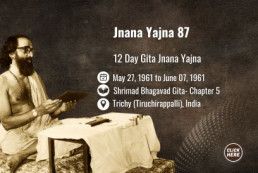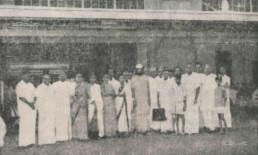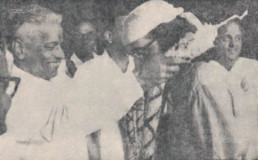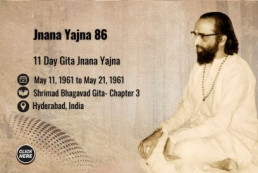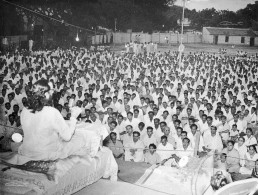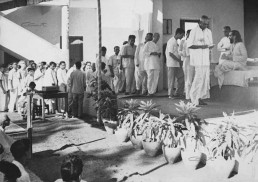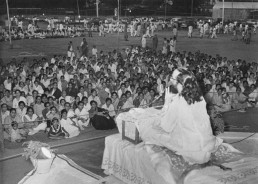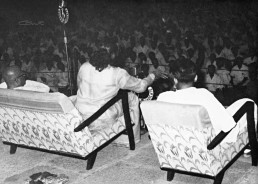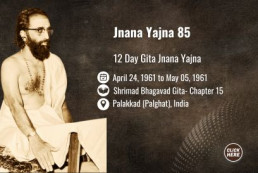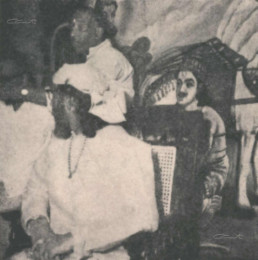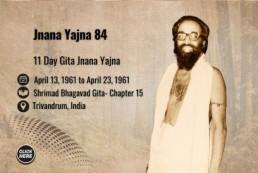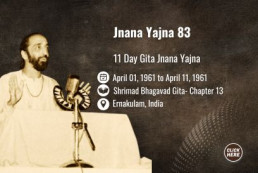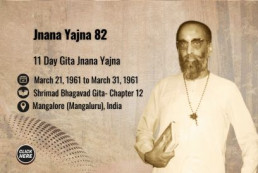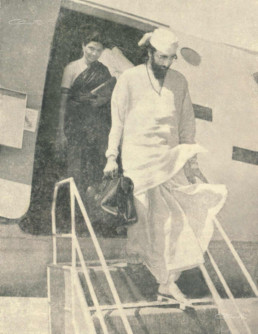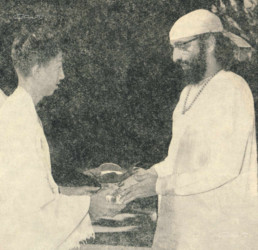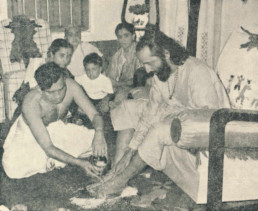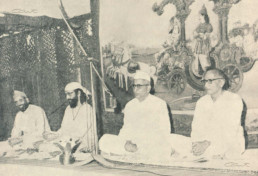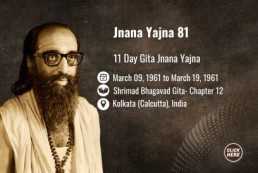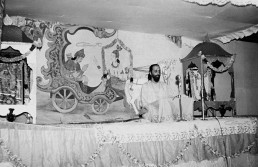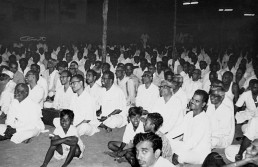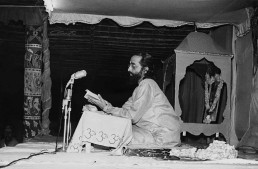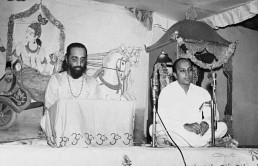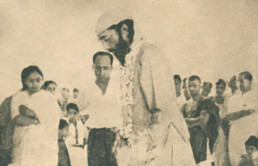Jnana Yajna 88
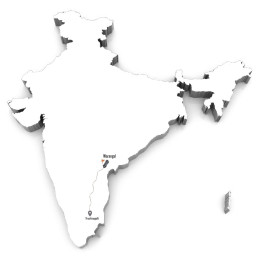
Jnana Yajna 88

Year & Dates:
June 15, 1961 to June 30, 1961

Yajna Topic:
Shrimad Bhagavad Gita- Chapter 12

Place:
Warangal, India
The scenic and ancient capital of the Kakatiya kingdom in Telangana, Warangal is known for its magnificent forts and artistic, architectural marvels like the Thousand Pillar Temple. After many attempts by two loyal devotees, Sri Narasimha Murthy, the secretary of the yajna committee, and Sri Janardhan Rao who was overseeing the construction of Sandeepany Sadhanalaya in Mumbai, the 88th Jnana Yajna of Pujya Gurudev was finally slated to be His first yajna in Warangal.
A disciple of Swami Jnanananda and a leading philanthropist, Maharaja Saheb Pusapati Vijayarama Gajapathi Raju (P.V.G. Raju) while inaugurating the long-awaited Jnana Yajna conveyed his gratitude for being selected again for the honor after he inaugurated Pujya Gurudev’s Mundakopanishad yajna in Hyderabad in 1960. He spoke about the differing journeys of seekers, the importance of diligent discipline, and the yogic paths of Jnana, Bhakti, and Karma.
Creating New Waves of Devotion
Since it was Pujya Gurudev’s first Jnana Yajna in Warangal, Pujya Gurudev highlighted the purpose of Jnana Yajnas during India’s times of spiritual inertia and moral distress. He stated clearly that “in order to achieve the renaissance of our culture, each individual must become an active center of cultural reintegration and this makes his own contribution.” From June 16-22, the discourses covered key introductory aspects of Vedanta and Srimad Bhagavad Gita, priming the audience to delve into the beauty of the chosen chapter of Bhakti Yoga in that 88th yajna. The topic for study in the mornings was Kenopanishad.
The Chinmaya Spell: Warangal was entranced by Pujya Gurudev’s powerful voice and spiritual vibrations, and the large number of seekers who clustered in the yajnashala understood the Chinmaya phenomenon for the first time. The incessant rains could not wet their enthusiasm, and the lack of space inside the auditorium did not deter them from finding options to hang on to every word that Pujya Gurudev uttered. They wished they could experience the bliss of the yatra with Pujya Gurudev; they were disappointed that the Ganga Prokshana ceremony also had to be cancelled. Nevertheless, Pujya Gurudev comforted their devoted hearts with His bountiful love which itself sanctified like the Gangajal.
Apart from His discourses and satsangs through the days, Pujya Gurudev invigorated the members of the Warangal Rotary Club and the students of the Engineering College and the Multipurpose School, Warangal.
For Reflection: Pujya Gurudev’s devotion to His audience awakens a sense of awe. Such was the Guru, deeply aware of the needs of a new audience, that He never resorted to shortcuts while teaching and did not dilute His precious foundational introductions.
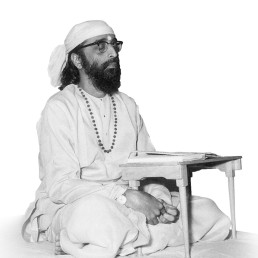
“Think,” Says Pujya Gurudev
“To whom censure and praise are equal’:- Not that he is immune to insults, nor is it because he is unintelligent enough to understand them. To a great devotee, living as he is in a realm of his own, full of transcendental and blissful experiences of the Divine, to him the worldly censure or even praise has no significance, or importance at all. He realizes that one who has been praised today will be censured by the society tomorrow, and the last year’s censured man becomes the praiseworthy leader of today. Praise and censure thus, express in themselves nothing more than the passing fancy of those who are doing them!
“ He is silent”:- A true man of wisdom becomes a man of few words not only physically but even mentally. Silence within is real silence (Mauna). To keep physical silence and let loose the mind to talk in itself generally results in a serious type of repression which ultimately drives many to the porch of a mental hospital.
From Tyagi Magazine
What is superior than knowledge?
Continuous intellectual effort leads to dullness, requiring occasional shock therapy to awaken awareness. The teacher emphasizes transcending knowledge and practice for detachment from the fruits of action, leading to efficient study and productive practice. True understanding enables focused contemplation and harnessing the power of meditation, essential for progress beyond anxiety and into effective action.
Jnana Yajna 87

Jnana Yajna 87

Year & Dates:
May 27, 1961 to June 07, 1961

Yajna Topic:
Shrimad Bhagavad Gita- Chapter 5

Place:
Trichy (Tiruchirappalli), India
To act or not to act? To participate or renounce? That was the question that Arjuna had when chapter 5 of Shrimad Bhagavad Gita began. And, Bhagavan Shri Krishna advocates action first for most of the seekers who, like Arjuna, are yet to evolve to a greater stage of dispassion. Then having developed the balance and ability to rise above likes and dislikes through selfless doing, the path opens up to renunciation. From Karma Yoga to Karma-Sannyasa Yoga is the progression, assures Bhagavan, and explains the different attributes of one who strives for and obtains the highest freedom throughout chapter 5.
Choosing that important chapter as the main topic for His 87th Jnana Yajna, Pujya Gurudev arrived at the yajnashala at Thillai Nagar, Trichy, which had gained the repute of a “dharmakshetra” after Pujya Gurudev’s previous two yajnas in that location.
How to Do, Renounce, and Realize
With an enthusiastic crowd looking on respectfully, a Purna Kumbha welcome was offered on May 28th evening to Pujya Gurudev after which Sri. Pasupati, then secretary of Chinmaya Mission Trichy hoisted the Om flag. Dr. Kalamegham, the president of the yajna committee, welcomed Pujya Gurudev warmly and also informed the audience about the upcoming Sandeepany Sadhanalaya in Mumbai. As a flagship spiritual institution, the Vedantic College would carry out the Chinmaya vision of spreading the message of the Hindu scriptures across the land while demonstrating the Upanishadic way of life.
Pujya Gurudev, in His previous yajna at Trichy, had taught Kena Upanishad. In the 87th yajna, He chose to conduct morning classes on Ishavasya Upanishad which belongs to the Vajasaneyi branch of the Shukla Yajur Veda Samhita. One memorable way in which He explained the famous Shaanti Paatha, “ Om Poornamadah Poornamidam…” of the Ishavasya Upanishad was through the simple but vivid analogy of the “ghost in a post.” Like the “ghost rose in the post, remained in the post, borrowing its reality from the post, and it merged back in the end into the post,” Pujya Gurudev explained that the entire world of plurality was sustained by the Absolute Reality that remains Unchanged and Whole. With brilliant clarity, expounding verse-by-verse the Upanishadic theme of realizing the Oneness of the individual and the Infinite, Pujya Gurudev infused confidence in the modern seeking minds that the Upanishads were not abstract literature of the past but contained the most applicable approach to rediscover the true identity of the individual, the world around, and the supporting Supreme.
As We Reflect…The firm foundation of Vedanta that Pujya Gurudev laid by “nationalizing the Vaidika Heritage,” by daring to bring the Upanishads and the Gita within the grasp of the maximum is a monumental blessing that continues to transform the world of seekers.
Photo Gallery

“Think,” Says Pujya Gurudev
When through Karma Yoga a man has thus gained an inward peace, both at his mental and at his intellectual levels, it becomes child’s play for him to deny and to restrain, to control and to guide, his sense organs and their never-ending appetites. A seeker (Yogi) who has thus controlled himself on all these three different layers in him, namely, his body, mind and intellect, becomes the best fit for the highest meditation. In fact, all our obstacles in meditation are nothing other than the mile-stones of sensuous appetites, emotional agitations and desire-problems. When once these chains are broken down, it comes to the natural condition of high meditation, wherein the re-discovery of the Self must be instantaneous and complete.
This realization of the Self cannot be partial; it cannot be if the meditator understands himself to be exclusively Divine. To realize, Divinity of the Self is Infinite and All-pervading. From the innermost sanctum of the Spirit when he looks out, he realizes nothing but Divinity-everywhere, at all times. Therefore, the Lord says, that such a one, “realizes one’s own Self as the Self in all beings.”
From Tyagi Magazine
Merit (Punya) and Sin (Papa)
Actions are judged not by their nature but by the intent behind them; selfless deeds are virtuous while selfish ones are sinful. The Supreme Lord remains impartial to both good and bad deeds, as it is the motive that determines their moral value.
Jnana Yajna 86
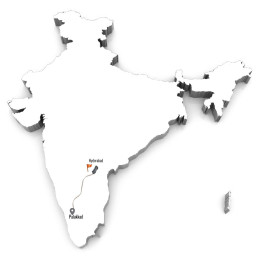
Jnana Yajna 86

Year & Dates:
May 11, 1961 to May 21, 1961

Yajna Topic:
Shrimad Bhagavad Gita- Chapter 3

Place:
Hyderabad, India.
Act we must from birth to death, emphasizes Bhagavan Krishna throughout Srimad Bhagavad Gita, and He also specifies that actions must be such that they prepare, purify, and integrate the body, mind, and intellect of seekers. Thus steadied and selfless, such seekers can undertake a successful final pilgrimage of Self-enquiry, for the rediscovery of the Omnipresent, Omnipotent, and Omniscient Divinity. So, to make life itself a worthwhile pilgrimage, Pujya Gurudev echoed the message of Bhagavan Krishna, bringing out the glory of action in His discourses during the 86th Jnana Yajna.
“Man, from being a mere laborer, develops himself to be a worker. This humanizing and divinisation of work forms the subject matter of Chapter 3 – titled” Karma Yoga” said Pujya Gurudev at the exhibition grounds in Hyderabad in the evening of May 11, 1961. The thousands who were present had already tasted the sweetness of His Vedantic discourses, and they were waiting to understand the path of uplifting action.
Igniting Knowledge Beyond Action
Earlier, in the august company of Swami Pranavananda of Gudivada (Vijayawada), Pujya Gurudev had been welcomed ceremonially. After the Om flag signaled the onset of Vedantic vichara, Swami Pranavananda, revered as a ‘Vision Teacher,’ spoke in chaste Telugu about the significance of the Gita for spiritual growth and the lasting contribution of Pujya Gurudev’s Gita Jnana Yajnas. Then, expressing His happiness for being back with the sincere audience in Hyderabad, Pujya Gurudev commenced talking about the wisdom in embellishing materialistic progress with rejuvenating value-based living. The stage was set to analyze the path of right action in the following days.
On the morning of May 12th, it was the turn of Hyderabad’s twin city, Secunderbad, to offer another effusive welcome to Pujya Gurudev who was again accompanied by Swami Pranavananda to the grounds of Keyes Girls’ High School. In that venue, Pujya Gurudev had chosen the topic of the poetic Kaivalyopanishad.
Outlining the Upanishadic thought-process, Pujya Gurudev said: “When Shraddha (faith) is more and more, Bhakti will automatically develop; and, when Bhakti comes, automatically Jnana will dawn. The analogy of the “Churning of the Fire” symbolizes the Jnana Abhyasa. When the personality is withdrawn from the Body-Mind-Intellect, the fire is ignited. Then the Paasha or bondage is burnt down. The spark of ignition, of understanding, does not result until we rub ourselves off our negativities The sparks of ignition thus generated is ‘that Energy which, ‘passing’ through the equipment gets the required work done because none of the instruments can function without the ‘I’ presiding over them.”
At Hyderabad and Secunderbad, the discourses in both yajnashalas reinforced both the path of deep introspection and liberating action. Over 5000 devotees followed Pujya Gurudev as He moved from Karma Yoga to the state of Kaivalya, swept and spellbound by His erudite knowledge and dynamic functioning.
For Reflection: Pujya Gurudev had almost a magical ability to make thousands churn their minds in unison on the most sublime concepts of Vedanta, simultaneously tasting the cream of the Upanishad and the Gita.
Photo Gallery
In the embrace of the spiritual talks by Gurudev, young toddlers, girls and women find not just knowledge, but a sanctuary where their voices are heard, their spirits uplifted, and their potential unleashed, igniting a ripple effect of transformation across generations and societies!
Swami Chinmayananda during 86th Yajna

“Think,” Says Pujya Gurudev
Man is encouraged to follow a life of action only when he comes to appreciate that way-of-life completely in his understanding. When the very theory is decried, it is not conducive for the intellect any longer to accept that theory. Thus, decrying a philosophy is a sign of one’s intellectual rejection of it. Having once rejected intellectually, there is no chance of an individual ever striving to live that philosophy. Karma Yoga is a way of life, and we have to live it if we want to come under its grace.
The path of work lies through a process of elimination of the desires in us. When egoism and ego-centric desires are eliminated the work accomplished through such an individual is the divine action, which is destined to have enduring achievements. To the extent man is not practicing this efficient way of work, he should grow necessarily unintelligent, and to that extent his discriminative capacity should be found deteriorating and ultimately destroyed.
From Tyagi Magazine
That the theme of the Upanishad can be experienced only through intuition has been already explained. To confirm that idea, here the Teacher totally denies all effectiveness for other methods of acquisition, in gaining the supreme Self of the Upanishads, By action and work we generally strive for and acquire the world of objects; sometimes an amount of happiness can be gained through the success of an even by the indirect help of those who depend upon us(Prajaya); an amount of happiness can be really ordered by wealth.
Direct effort, indirect help, purchase by wealth- these are the three avenues through which we come to our worldly success and happiness. We achieve happiness in daily life either through our self-effort (Karmanaa), or sometimes our self-effort is supplemented by the help we get from others (Prajayaa) and at other times, we gain happiness by purchasing it with wealth (Dhanena). None of these methods of transaction, which are available in the world of objects, can bring to us spiritual solace or subjective wisdom.
From Kaivalyopanishad Book
Don’t do this to your children!
We are influenced by external factors, such as societal expectations and the success of others, leading us to stray from our true inclinations. Recognizing and nurturing our inherent tendencies from a young age can lead to greater fulfillment and success, as evidenced by methods employed in education and career choices.
Jnana Yajna 85

Jnana Yajna 85

Year & Dates:
April 24, 1961 to May 05, 1961

Yajna Topic:
Shrimad Bhagavad Gita- Chapter 15

Place:
Palakkad (Palghat), India.
Through repetition and reflection, onward to Realization – Pujya Gurudev demonstrated this indispensable formula for spiritual evolution in His every step and every Jnana Yajna. The people who followed Him from Thiruvananthapuram to Palakkad may perhaps have glimpsed that when they listened to the sacred 15th chapter of Shrimad Bhagavad Gita one more time at the grounds of Government College, Palakkad. Even though they heard it again, the teacher par excellence brought forth another subtlety, another striking interpretation which astounded seekers. His expressions varied like the patterns in a kaleidoscope and fascinated both seasoned followers and aspirants who heard Him for the first time.
With such reverent expectations, the collector of Palakkad (Palghat), Sri Rama Varma Kochappan Thampuran, who was also the president of the yagna committee received Pujya Gurudev at the gates to the College grounds where the yajnashala stood eager and packed.
A Master Preceptor and Motivator
It was another crisp beginning, and the hoisted Om flag indicated that another unforgettable Jnana Yajna had commenced on the evening of April 24, 1961; it was the fourth Jnana Yajna hosted in the first 108-yajnas series at Palakkad, and the audience of Palakkad were primed and ready for the swift pace and focused learning. As Pujya Gurudev painted the picture of the mystical ‘tree of samsara,’ and instructed the ways to cut down the trapping roots of bondage, the audience visualized and absorbed with deep regard. Pujya Gurudev Himself had referred to the chapter 15 – Purushottama Yoga – as the rarest piece of spiritual literature which came closest to defining the Indefinable. So, when He explained verse after verse, the all-pervasive and beyond-all, the discourses were truly pure meditation.
Vedanta Non-stop: Wherever Pujya Gurudev went, a spiritual ripple effect was established. So, in addition to Gita chapter 15 in the evenings in Palakkad from 6 pm to 8 pm, the town of Kollengode (14 miles away from Palakkad) was blessed with Pujya Gurudev’s discourses on Vivekachoodamani in the mornings from 6 am to 7 am. He then traveled back to the Palakkad Government College auditorium to conduct Kenopanishad classes from 8 to 9 in the morning.
Motivating Moments: Apart from His yajna commitment, on April 26th, Pujya Gurudev inaugurated the Rashtriya Swayam Sevak’s (RSS) Camp at Nurani, the place where cadets from all southern states trained intensely for a month. Calling for value-based actions aligned with our Vaidicka (Vedic) scriptures, He defined “a Bharatiya is one who revels in his own self-effulgence.”
Stopping at Kalady, the birthplace of Adi Shankara on April 30th, He presided over the Silver Jubilee celebration of the Advaita Ashram & College there. The very next day, He went to Tattamangalam, about 15 miles away, to give an encouraging address during a meeting organized by the Devi Group and the local Bala Vihar. After the Jnana Yajna was completed, He thrilled the children in the three-day Bala Vihar camp at Kollengode, awarding prizes and participating in the valedictory ceremony.
We reflect…In all the haste of events one after another, Pujya Gurudev displayed superb harmony in thought, word, and deed. It was as if events moved around Him while He was centered on That Purushottama.
Photo Gallery

“Think,” Says Pujya Gurudev
‘Nor sun nor moon, nor fire illumine That’:- Herein is enumerated almost all the sources of light, blessed by which the physical eyes experience vision. To see a thing is to know the things; and in order that the organ of vision might use its powers of seeing, it is not only sufficient that objects are in front of it but they must also be bathed in light. In a medium of light alone can the eyes illumine the sounds, the nose illumines the smell, the tongue perceives the tastes. The skin understands the touch. Each instrument illuminates its objects. Nor even this is the all. We can perceive our feelings, and we do perceive our ideas. The “light” in which we perceive thus all our sense objects, all our emotions, and all our thoughts, is the Light of Consciousness, by which alone we become Aware of all our experiences.
From Tyagi Magazine
God alone knows God!
Remember that we are mere instruments for the divine to express through. Our limitations prevent us from realizing the divine, likening the process to a dreamer awakening to reality, where the ego and mortal limitations dissolve into the infinite. Ultimately, the journey towards realizing the divine involves transcending our individual identities to merge with the boundless ocean of consciousness.
Jnana Yajna 84

Jnana Yajna 84

Year & Dates:
April 13, 1961 to April 23, 1961

Yajna Topic:
Shrimad Bhagavad Gita- Chapter 15

Place:
Trivandrum, India.
A shorter duration, a more direct approach minus the inauguration festivities – this was slowly becoming the updated format of Pujya Gurudev’s Jnana Yajnas as He compassionately tried to honor the requests from numerous cities around the country before Sandeepany Sadhanalaya opened.
So, after the Om flag was hoisted by Sri A. S. Menon in front of the elegant pandal in Thiruvananthapuram Palace grounds as the sacred signal, the 84th Jnana Yajna began in full earnest.
Pujya Gurudev’s Opening Remarks: “It is axiomatic that one can contemplate on a thing only if he detaches himself from the object of contemplation. Thus, only if one detaches himself from the objective world, he can sit back and contemplate subjectively whether there is any guiding factor which forms the basis for this regularity, harmony, rhythm, and unity which we see in all objects of nature ranging from the minutest particle to the great solar system.”
Deep Thinking Beyond Boundaries
Pujya Gurudev prefaced by tracing human evolution on the mental plane from wondering, observing, enquiring, and finally contemplating on the source and purpose of everything. From that evening on April 13, 1961, until the yajna concluded on April 23rd, He guided thousands of seekers on the challenging yet highly rewarding path of contemplation.
With the exalted Purushottama Yoga as the main topic for the yajna, Pujya Gurudev first indicated how the key chapter of the Gita explained “the nature of the ultimate Reality, both Transcendent and Immanent at the same time, in all manifested objects.”
Continued Churning: The deep introspection continued during the morning discourses when more than 300 seekers gathered in the yajnashala to carefully take in Pujya Gurudev’s detailed exposition on Ishavasya Upanishad. Dwelling on the Supreme Eternal through the texts of Shrimad Bhagavad Gita and the upanishad from morning to night, the minds of the blessed seekers at Thiruvananthapuram got tuned, almost unconsciously, to an unusual state of calmness, induced by those powerfully spiritual one-and-a half hour sessions twice a day.
Starting Young and New: An endearing sight during the Jnana yajna was the lively morning satsangs that Pujya Gurudev enjoyed with the youngest seekers. Through kirtans, animated story-telling sessions, and amazing chanting of the Gita, the sweet and sprightly children of Bala Vihars and Pujya Gurudev entertained one another.
In the night satsangs after the main discourses, it was heartwarming and stimulating to watch how Pujya Gurudev patiently answered all types of questions – from the thoughtless to the profound – that the new aspirants heaped on Him.
For Reflection: It was a shared experience of every audience across cities that in the presence of Pujya Gurudev, the concept of time and space simply faded into insignificance.

“Think,” Says Pujya Gurudev
“Free from pride and delusion:” Both these qualities of pride and delusion indicate a false exaggerated estimate of oneself and others. Erroneous estimate of one’s own importance is called pride, and it brings about an enormous amount of heavy responsibilities upon oneself to maintain it. There is no time thereafter for him to cultivate himself or to seek knowledge or get himself or to seek knowledge or get himself educated. Similarly, error in judgment regarding things and beings, happenings and situations, in the world outside, called delusion, makes us live in a false world of our own imagination without actually facing the immediate problems around.
‘With the evil of attachment conquered’: To live in the flesh, and seek our life’s fulfillment only in the joy drive from our contracts with the sense-objects in the world around us, is to live in the outer bark, cheating ourselves entirely from life’s deeper possibilities. Such an ignorant fool gets extremely attached with the objects of the world, and once this attachment has grown, all his attention in life will be irresistibly turned towards these objects. Shackled by them, dancing ever to their rhythm of change and destruction, he comes to lay waste his powers, without ever realizing the nobler purpose of the Life Divine.
From Tyagi Magazine
Are you putting enough effort?
In this video Swami Chinmayananda highlights that sincere spiritual efforts lead to attainment, cautioning us against divided focus caused by unresolved desires. Lack of integration between mind and intellect impedes spiritual growth, highlighting the need to purify thoughts and cultivate detachment. Those who have purified their minds find the path to higher consciousness clear, as seen in the story of Nachiketas from the Kathopanishad.
Jnana Yajna 83
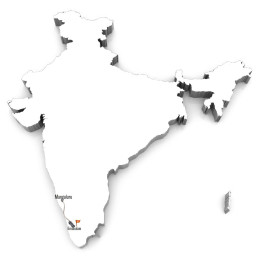
Jnana Yajna 83

Year & Dates:
April 01, 1961 to April 11, 1961

Yajna Topic:
Shrimad Bhagavad Gita- Chapter 13

Place:
Ernakulam, India.
On His way to Ernakulam for His 83rd Jnana Yajna after a successful but hectic yajna at Mangalore, Pujya Gurudev had barely rested on the train because of devotees who rushed to meet Him in every station.
From station to station…When the train pulled into Shoranur station at 3 am on April 1, 1961, He was received by the enthusiastic members of the Tripunithura yajna committee and escorted to Ernakulam; His aunt, Kochu Narayani Amma whom He looked upon as His mother, was delighted to see Pujya Gurudev. In a short while, He had to leave with the Ernakulam yajna committee members to the Ernakulam railway station back again to accommodate the loving reception planned for Him from that location! He accepted, with great kindness, to be part of a joyful reception procession and finally reached the Amma Raja Palace where the yajnashala and his place of stay stood waiting. His long day had just begun.
Paramount, Powerful Giver
Two receptions, two processions, two spirited inaugurations, and three texts – Between Tirupunithura and Ernakulam which are separated by just under 6 miles, Pujya Gurudev shuttled tirelessly, spreading knowledge with inestimable amounts of love.
Kenopanishad: At Tirupunithura, He listened quietly to the praise given by Justice Govinda Menon who inaugurated that segment of the three-in-one 83rd yajna. He reminded the audience how sages, having observed, analyzed, and contemplated on the science of life revealed their knowledge not for just philosophizing but actually living those truths. The text He would expound on that stage was Kenopanishad.
Ishavasya and Gita: The next evening at the Durbar Hall Grounds,Ernakulam, after another energetic welcome on a brightly lit dais with the iconic Gita background, He described how as ‘modern Arjunas,’ seekers must face what comes in life with a sportive and balanced outlook, casting away the “veil of ignorance.” With that, He began explaining the verses of chapter 13 describing the significance of the field of life and the Knower. Pujya Gurudev began discourses on Ishavasya Upanishad from the next morning.
A source of wonder, Pujya Gurudev effortlessly moved from the morning Ishavasya Upanishad to the evening session of Kenopanishad from 5:45 pm to 7 pm at Tirupunithura before moving on to Ernakulam to roar the message of the Gita from 7:30 pm to 9 pm. His slender physical frame was strained, but His fiery eloquence was unabated. His days were filled with satsangs, and there was no Guru Dakshina collected during that yajna.
On the final day after the discourses were completed, the Balavihar children enacted a beautifully clear drama in clear, simple Malayalam based on Chapter 13. It was a splendid performance through which the doubts of Arjuna and the brilliant answers of Bhagavan Krishna were etched in the minds of the audience.
For reflection: Pujya Gurudev’s incredible level of functioning, much above His physical capacity, clearly showed He was one with the Highest.

“Think,” Says Pujya Gurudev
After thus indicating the one Spirit behind all the world-of-matter, wherever it may be, Krishna declares that according to him a correct knowledge, vitally experienced and lived, of what constitute in each one of us, the perishable, changeable, finite, inert matter and what is the nature of the Infinite, Imperishable and Sentient Spirit, is the Supreme Knowledge. “Kshetra” is the field-of-matter which is constituted of the various equipment of perception and the vast fields of the perceived. “Kshetrajna” is the subject that enjoys the activities of the instruments of perception and the world perceived by them. To distinguish thus the world-of-the-subject and the realm-of-the-objects of the salutary Knowledge which can redeem us from our present confusions and sorrows, which we experience to-day as individualized egos.
From Tyagi Magazine
What is Changeless amidst all Changes?
Using the analogy of petrol and the car, Gurudev underscores the difference between the eternal spirit and the transient material world, emphasizing the omnipresent energy that enlivens all life.
The Paramatman, unchanging and timeless, remains unaffected by the workings of Prakriti. Similar to how petrol fuels a car without being the driver or experiencing the journey, the Self imbues beings with vitality without engaging in action or experiencing the consequences. Recognizing oneself as the constant amidst change and the inactive amidst actions leads to the realization of the Self’s eternal nature.
Jnana Yajna 82
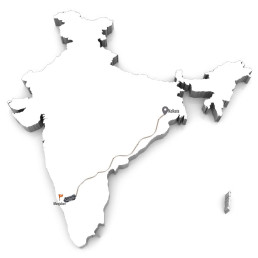
Jnana Yajna 82

Year & Dates:
March 21, 1961 to March 31, 1961

Yajna Topic:
Shrimad Bhagavad Gita- Chapter 12

Place:
Mangalore (Mangaluru), India.
Their first stop was because of curiosity. Their second exposure sparked inspired reflections, and with the third Yajna announced, they readied themselves for deeper immersion – Such was the progression in the journey of the Mangaluru audience as they awaited their third Jnana yajna and the 82nd Jnana Yajna of Pujya Gurudev.
A significant flying visit…He landed on March 21st morning after an important halt at Mumbai on completing the 81st Jnana Yajna at Kolkata. The Mumbai stopover was to oversee the sacred sankalpa of Sandeepany Sadhanalaya taking shape. The lecture hall, dining hall, kitchen, and the hostels were constructed; and, Mr. Janardhan, a devotee from Hyderabad supervising the College construction activities, was guiding the construction team to lay the foundation for Pujya Gurudev’s kutiya. Bringing with Him the energy from that devoted work in Mumbai, Pujya Gurudev had chosen chapter 12 of the Gita again – Bhakti Yoga!
Devotion and Contemplation Reinforced
Wishing for Guidance: On the evening of March 21st at 6 pm, Dr. Gollerkeri, the president of the yajna committee, welcomed Pujya Gurudev and all to the 82nd Jnana Yajna thus: “To the Mangalore public, our beloved and revered Swamiji, your name and fame have become household words, standing for all that is worth knowing in the Hindu philosophy and religion…We pray that you give us clear directions on how to build our individual and joint spiritual culture in the future when no more can we hope to jointly sit at your feet and absorb your priceless advice at close quarters.” His words echoes a widespread concern that Pujya Gurudev’s Jnana Yajnas would be suspended for a while because of His commitment to develop Sandeepany Sadhanalaya for the next few years.
The Inaugural Address: Sri B. Vaikunta Baliga, Minister Law and Labor, Mysuru, after inaugurating the Jnana Yajna, reflected: “The Gita affirms that spiritual life is essential if we have to manifest superior human virtues. If a scripture is to be useful, it must fulfill two essential conditions: (1) whether it helps man to discover himself, and realize inner peace and (2) whether it contributes to social and national harmony. The philosophy of the Gita fulfills both the conditions in an eminent way.”
The Discourses and the Audience: With a strong emphasis on the need for religion, Pujya Gurudev said that human progress had empowered a thinking individual for the next stage of evolution through contemplation. His discourses every morning on Purushottama Yoga encouraged the audience to wonder about That Transcendent Reality. Pujya Gurudev’s discourses on chapter 12, Bhakti Yoga, invoked the purifying strength of devotion and revealed the endearing beauty of surrender to the Divine Grace of Bhagavan.
As we reflect…The Vedantic Renaissance that Pujya Gurudev flagged off was steered and fanned with consistent efforts. He reignited spiritual thirst and brought out the full force of the Gita with the conviction that “repetition fosters reflection.”
Photo Gallery

“Think,” Says Pujya Gurudev
With perfect faith: Faith is generally understood as a “blind belief”. This is not the Shraddha here meant. The term Shraddha has been beautifully described by Shri Shankaracharya as follows:-”That is called the ‘Spirit-of-faith’ by which an individual understands readily the exact import of the scriptural text as well as of the pregnant words of advice of the Preceptor- by which alone the reality of things becomes clearly manifested”. Without this faculty developed in him a devotee may not succeed sufficiently in bringing about a self-divinisation in himself even after years of practice.
Thus three main conditions are enumerated in this stanza as essential and unavoidable for one to become a true devotee. Perfect faith, ever steadfast in worship and one’s mind totally merged with the concept of the Lord are the three conditions, and if these are accomplished in anyone he is considered as the most steadfast devotee by the Lord.
From Tyagi Magazine
Prayer Room not meant for All!
Discover why the prayer room is not necessarily meant for all, according to Swami Chinmayananda. Instead, learn how to bring spirituality into your daily life and find the divine in your work, transforming your actions into worship. Explore the profound insights on integrating spirituality into your everyday tasks for inner peace and fulfillment.
Jnana Yajna 81
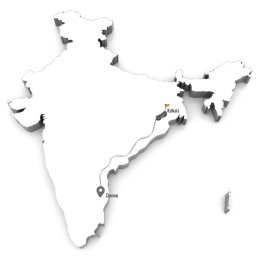
Jnana Yajna 81

Year & Dates:
March 09, 1961 to March 19, 1961

Yajna Topic:
Shrimad Bhagavad Gita- Chapter 12

Place:
Kolkata (Calcutta), India.
“Hold the yajna in March 1961 or defer it” – The concise note from Pujya Gurudev arrived in the middle of January, and the yajna committee in Kolkata decided to seize the opportunity presented to them after a two-year-pause since the 56th Jnana Yajna hosted in mid-1959 at Kolkata.
His limiting adjuncts…As they began the planning in earnest, another message from Pujya Gurudev stunned them. It would be a whirlwind 11-day yajna instead of the 21-day series, and the formalities of a formal reception, inauguration with the Om flag ceremony, and a protracted presidential address were to give way to a plain and pure start to earnest study of the 12th chapter of the Gita.
The arrangements were done quickly and efficiently. The verses of Chapter 12 were printed and ready for distribution, the publicity materials were prepared, and the venue for the yajnashala was fixed.
Simpler Format for Potent Study
The Beginning: Right after He landed in Kolkata on March 8th, Pujya Gurudev did a quick check of the yajnashala at the Hindi High School, Lower Circular Road. The 81st Jnana Yajna commenced at 7 pm on March 9, 1961, with the auspicious Purna Kumbha welcome, an elegant array of the classic white and red Kolkata saree-clad devotees with diyas, and the resounding Om as He walked to the dais. Sri Ishwarprasad Goenka, the president of the yajna, spoke briefly in Hindi, and then Pujya Gurudev took everyone right into the heart of Shrimad Bhagavad Gita.
The Discourses and the Audience: With eleven days and 20 verses, the pace was brisk and the content was gripping. The audience grew, with women attending in large numbers as they converged from all parts of Kolkata to that centrally located yajnashala. Carrying all in a great wave of Bhakti, it appeared as if Pujya Gurudev made even the nor’wester showers pause and worship Bhagavan Krishna through the Gita. The beauty of Bhakti Yoga effaced the disappointment of the canceled morning classes and a spiritual yatra.
A Sweet Interlude: A children’s event when about 40 children recited the verses of Bhaja Govindam and the Gita Dhyanam delighted Pujya Gurudev. Spending an hour among the little ones and rewarding them with fruits was a refreshingly joyful experience for the tiny devotees and the glorious Guru.
The Conclusion: The intense immersive evoked deep gratitude, and as the winding line of devotees offered their Guru Dakshina with loving reverence, they felt more blessed to receive the Yajna Prasad booklet “Kindle Life” from the holy hands of Pujya Gurudev. The 81st Jnana Yajna concluded on the morning of March 19th since Pujya Gurudev had to reach Mumbai by March 20th for work related to Sandeepany Sadhanalaya.
For Reflection: Having accomplished the tasks of making a great cross-section of India aware of Jnana Yajnas, Pujya Gurudev was gently jettisoning the accompanying features and reshaping His Jnana Yajnas for more time-efficient, focused study.

“Think,” Says Pujya Gurudev
No undertaking in our life, in fact, is a new act that has an independent beginning or end. All actions in the world are in an eternal pattern of the total world-movements. If correctly analyzed our undertakings are controlled, regulated, governed and ordered by the available world-of-things and situations. Apart from them all, no independent action is undertaken or can be fulfilled by anyone. A devotee of Truth is ever conscious of this oneness of the Universe and, therefore, he will always work in the world only as an instrument of the Lord, and not as an independent agent in the undertaking.
From Tyagi Magazine
This is the Simplest way to be Happy!
In a world filled with problems bombarding us from all sides, adopting an attitude of indifference can be liberating. Focus on what you can control, like caring for your immediate circle, while letting go of worries beyond your reach. Embracing this mindset allows for inner peace amidst the chaos of the world.
Jnana Yajna 80

Jnana Yajna 80

Year & Dates:
February 06, 1961 to March 07, 1961

Yajna Topic:
Shrimad Bhagavad Gita- Chapter 13, 15 & 16

Place:
Chennai, India.
The Yajnashala: The spacious lawns of the well-established P.S. Higher Secondary School in the Mylapore neighborhood of Chennai took on a spiritual glow as the thoughtfully adorned Pandal sprung up, awaiting the 80th Jnana Yajna of Pujya Gurudev.
The Inauguration: After Pujya Gurudev was received with traditional honors, the Om flag flew high to signal the start of the Jnana Yajna. The fact that the invocation for the Gita Jnana Yajna was sung by Shri Bhakta Majeed, a muslim by faith, indicated the universality of the text.
From the Inaugural Message: Shri Pethachi, President of the Madras Chinmaya Mission, inaugurated the yajna and expressed with respectful honesty that “the purposeful and kindly play of the Divine Hand of Providence in the unforeseen delays in the starting of the Sandeepany Sadhanalaya” resulted in good fortune for the Chennai seekers in the form of that 80th Jnana yajna.
Unshaken, Divine Vision
Pujya Gurudev’s Opening Address: In Pujya Gurudev’s previous Upanishad yajna discourses in Chennai on Mandukya and Gaudapada’s Karika, “the great Rishi refused to come down from the olympian heights of Brahman realization to our levels of common, work-a-day-life, but simply beckoned us to scale the rocky, precipitous heights by pointing out the path.” In contrast, the approach in Srimad Bhagavad Gita, Pujya Gurudev described thus: “Supreme Lord Krishna comes down to our level, enters our very cowshed and with the familiar flute, the cowherd’s stick and butter in hand, stands shoulder to shoulder with us and takes us step by step to the summit of Perfection.”
Illustrating how science neglects a deeper enquiry on an important front, Pujya Gurudev gave an analogy of a six-year-old who thought he no longer needed his parents after he got home from school and saw the refrigerator at home full of milk, fruits, and other eatables. “Just as the little boy, in his innocent immaturity, could not enquire as to who had put those fruits and milk inside the fridge, the modern scientists while proudly claiming to discover the Laws of Nature, do not contemplate on that Potent Agency that had ordained these laws and maintained them with a beauty and rhythm that could never be done by man. This Concept is God.”
The Audience: To the huge gathering that attended every day, Pujya Gurudev explained how the misaligned contact between the body-mind-intellect equipment and the experiential field became the source of all suffering. They were awestruck by Pujya Gurudev’s way of indicating the Supreme through the verses of Purushottama Yoga. The Prashnopanishad classes in the mornings made the serious seekers contemplate on the unifying essence which also seamlessly echoed in the Gita discourses.
For Reflection: Pujya Gurudev was unperturbed by the challenges and delays that cropped up before the opening of Sandeepany Sadhanalaya. His mission and vision through the Jnana Yajnas continued with the same enthusiasm.
Photo Gallery

“Think,” Says Pujya Gurudev
Vedanta preaches not so much the negation of the world as it advocates a re-evolution of the things, beings and happenings constituting the world. Generally we perceive our own pet ideas and emotions coloured by our own unsteady understanding and changing emotions. To see the world not through these equipments but with the clear eye of wisdom is to recognise perfection and bliss, divinity and sanctity, in the very drab and dreary world of today, amidst its own sorrow and ugliness. Erroneous perception of Reality through maladjusted equipment’s is the perception of the world which in its turn is throttling the individual so perceiving it.
From Tyagi Magazine
Bhagavad Gita on Suicide!
Explore a profound twist on the concept of “suicide” in the Bhagavad Gita—is it more than just the conventional meaning we know? Delve into the intriguing idea of how we may be limiting ourselves while still alive, and why this could be considered a greater form of self-restriction. Curious? Let’s uncover the deeper insights together.
Jnana Yajna 79

Jnana Yajna 79

Year & Dates:
January 15, 1961 to February 05, 1961

Yajna Topic:
Shrimad Bhagavad Gita- Chapter 2

Place:
Chittoor, India.
With the dawn of 1961, the swift spread of the Jnana Yajnas to more new cities also meant increased travel and greater commitments for Pujya Gurudev. But the tireless Master functioned from a realm that was not bogged down by time, place, numbers, or accolades.
For His 79th Jnana Yajna, Pujya Gurudev arrived in Chittoor, Andhra Pradesh. The audience, waiting to hear Him for the first time in their town, had gathered in the yajnashala inside the Chittoor school grounds.
The Reception: Just like in other locations, Pujya Gurudev was honored ceremoniously with the Purna Kumbha. “Purna Kumbha” meaning “a full pot,” this ritual signifies how the human body is made abundant by the divine fullness of the Life Principle. When a Purna Kumbha is presented to a sannyasi along with the chanting of the Vedic Arati, it is an act of reverence to recognize the state of fullness that has been gained through scriptural Knowledge.
Full Within and Filling All
The Welcoming Address: Sri C. Venkataramanayar, the president of the reception committee, extended a cordial welcome to Pujya Gurudev and spoke about the importance of knowing the symbolic depths of Hinduism. Quoting the Irish playwright, G.B. Shaw, he said: “The apparent multiplication of Gods is bewildering at first sight; but soon you discover that they are all the same God, in different aspects and functions. This makes Hinduism the most tolerant religion in the world, because its one transcendent God includes all possible gods.”
The Chief Guest’s words: Shri K.S. Ramaswami Sastriar, a scholarly octogenarian and retired District Judge who had served in Chittoor in 1922, reminisced how he had attended Pujya Gurudev’s Jnana Yajna in Chennai in 1953 and later had the opportunity to write the foreword to His commentary on Shrimad Bhagavad Gita. Shri Sastriar hailed Pujya Gurudev as the “prophet of the world’s new Age.” Modifying the final verse of the Gita, He said, “Where Krishna, the Yogeshwara, and Chinmaya with bow in hand (bent on action) are together present, there, success and Grace of God will surely come.”
From Pujya Gurudev’s Inaugural address: Calling Himself as only a seeker, Pujya Gurudev shared how He too had first questioned the worth of Hindu culture. He urged the youth of India to investigate Hinduism with firm rational analysis. Tracing how humankind had moved from the era of perception and observation into analysis, He stated that Science had paused to wonder at the threshold of religion: “Who is the law-giver of nature; why is it that natural laws are never disobeyed? Who am I? Whence and why did I come?”
The Discourses and the Audience: As Pujya Gurudev unfolded the comprehensive philosophy through the compelling verses of Gita’s chapter 2 and supplemented the knowledge through the morning classes on Atma Bodha, Chittoor was captivated. For the few non-English seekers who sat through the discourses in reverent silence watching every gesture, Pujya Gurudev quickly arranged for Telugu translations.
For Reflection: The questioning masses identified with His quest, and He understood their seeking with deep empathy, even though He had reached the Destination. That was the inspiration that drew thousands wherever He went.

“Think,” Says Pujya Gurudev
That the same objects can give two different types of experiences to two different individuals is very well known. The object remains the same, if it can give different experiences, it is evidently clear that it is because of the difference in the mental composition in the individuals. It is also observed that objects of one’s intense fancy during a certain stage in our life, by themselves become a nuisance to the same individual after a time; for, as time passes on, the mental constitution of the individual also gets changed. In short, it is very clear that the external objects can convey their stimuli to the level of our experience only when our minds through the sense-organs come in contact with the objects.
He who can understand that the objects-of-the-world, in the flux of change, should ‘come and go’ should come to exist and disappear to perish; he shall not allow himself to be tossed by the existence or non-existence of the finite things of the world. In the flood of time, things and incidents, circumstances and environments flow up to our present from the unknown future, to give us vivid experiences of carried intensity, and they, in their very nature, cannot remain permanently but must of necessity pass on to become one with the entire past. Nothing can remain the same, even for a short period, in the world-of-objects where change alone is the changeless law.
From Tyagi Magazine
Why are you not Happy?
We lack control over our minds, thereby incessantly chase fleeting desires, and devoid ourselves of inner peace and contentment. Without the ability to contemplate consistently, we remain trapped in mental agitation, unable to find true happiness. To attain mastery over the mind, one must control the senses, rise above attachments and aversions, and act in the world with equanimity.

